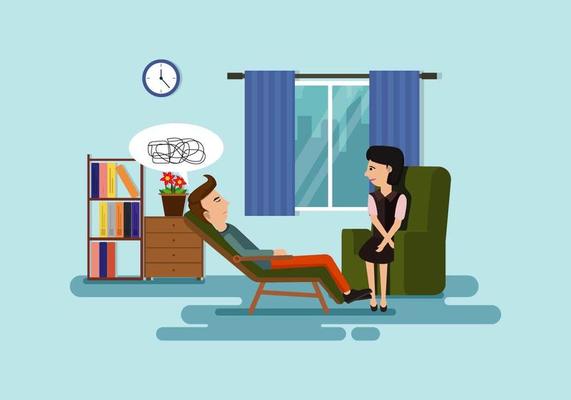Top Reasons to Consult the Best Psychologist in Delhi for Your Emotional Health and wellness
The Duty of Psych Therapy in Managing Anxiety and Clinical Depression
Psychiatric therapy has actually become a foundation in the administration of anxiousness and clinical depression, providing customized interventions that range from Cognitive-Behavioral Treatment (CBT) to mindfulness-based strategies. These techniques not just help people in determining and restructuring negative thought patterns however likewise foster present-moment awareness, reducing the propensity to ponder. As we check out the different measurements of psychiatric therapy, it comes to be apparent that these approaches do greater than just reduce signs and symptoms; they significantly boost emotional guideline and interpersonal skills - Best Psychologist in Delhi. What continues to be to be examined is exactly how these restorative strategies can be efficiently customized to meet individual needs, thus enhancing their effect.
Understanding Anxiousness and Clinical Depression
Understanding anxiety and anxiety needs a detailed consider these prevalent psychological health problems, which commonly coexist and considerably impact an individual's day-to-day live. Anxiety is defined by persistent, too much worry and are afraid concerning daily circumstances. Symptoms consist of restlessness, rapid heart rate, and problem focusing. Conversely, depression manifests as a pervasive feeling of hopelessness, despair, or emptiness, usually accompanied by a loss of rate of interest in formerly enjoyed tasks, changes in appetite, and rest disturbances.
The conjunction of anxiety and anxiety can intensify symptoms and complicate medical diagnosis and treatment. Individuals enduring from both conditions may experience a lot more extreme signs and symptoms, higher impairment in work and social performance, and a longer duration of ailment. This comorbidity necessitates a nuanced understanding and technique to treatment.
Cognitive patterns like unfavorable reasoning and maladaptive habits can continue these problems. Comprehensive assessment by psychological health and wellness professionals is crucial to discern the existence and extent of these problems, leading the way for customized therapeutic techniques.
Types of Psychotherapy
Psychotherapy, additionally called talk treatment, encompasses a range of therapy modalities designed to reduce symptoms of anxiousness and depression by addressing the underlying mental and psychological concerns. Different sorts of psychotherapy are customized to satisfy the distinct demands of people, providing a range of approaches to psychological healthcare.
One widely used type is psychodynamic therapy, which focuses on understanding and dealing with subconscious disputes originating from early life experiences. By discovering these ingrained concerns, individuals obtain understanding right into their existing behavior and emotion.
Social Treatment (IPT) is another effective method that concentrates on boosting social connections and social functioning to minimize depressive signs and symptoms. It generally attends to concerns such as despair, function changes, and social disputes.
Humanistic treatments, such as Client-Centered Treatment, stress personal development and self-actualization. Best Psychologist in Delhi. These techniques develop an encouraging atmosphere where individuals can discover their feelings and develop a stronger feeling of self
Last But Not Least, Dialectical Behavior Modification (DBT) combines cognitive-behavioral strategies with mindfulness methods. Originally established for borderline individuality problem, DBT has been adjusted to treat anxiousness and clinical depression by mentor abilities in distress tolerance, emotional law, and social efficiency.
These varied psychotherapeutic methods offer numerous pathways to mental health and wellness and health, accommodating restorative demands and private preferences.
Cognitive-Behavioral Treatment (CBT)
Amongst the numerous psychotherapeutic modalities, Cognitive-Behavioral Therapy (CBT) stands apart for its organized, goal-oriented technique in treating anxiety and clinical depression. Developed by Aaron T. Beck in the 1960s, CBT is predicated on the principle that maladaptive reasoning patterns add considerably to psychological distress and behavior concerns. By recognizing and restructuring these unfavorable idea patterns, CBT intends to minimize signs and symptoms and foster healthier cognitive procedures.
CBT is generally temporary, covering 12 to 20 sessions, and involves a collaborative effort between therapist and client. The therapy includes a selection of techniques, including cognitive restructuring, direct exposure therapy, and behavior activation. Cognitive restructuring concentrates on testing and modifying distorted cognitions, while exposure treatment slowly adjusts people to anxiety-provoking stimulations, decreasing evasion actions. Behavioral activation looks for to increase involvement in satisfying activities to counteract depressive states.
Empirical proof underscores the efficiency of CBT, with countless researches showing its efficiency in decreasing symptoms of anxiousness and anxiety. This restorative approach has actually been adapted for different populaces and settings, verifying have a peek at this site versatile and flexible. Its structured nature, empirical support, and focus on ability acquisition make CBT a cornerstone in the psychotherapeutic treatment of anxiousness and anxiety.
Mindfulness-Based Strategies
Mindfulness-Based Techniques have actually amassed considerable focus over the last few years as reliable treatments for stress and anxiety and depression. Rooted in old reflection methods, these methods aim to grow an enhanced awareness of today minute, which can aid people disengage from the ruminative idea patterns usually related to anxiety and depressive conditions.

In A Similar Way, Mindfulness-Based Cognitive Treatment (MBCT) integrates concepts from Cognitive-Behavioral Treatment (CBT) with mindfulness methods. MBCT is specifically reliable in avoiding relapse in people with recurring depression. By identifying very early indication of depressive episodes, people educated in MBCT can apply mindfulness practices to reduce the onset of full-on episodes.
Benefits of Psychotherapy
Various research studies have actually demonstrated the profound benefits of psychiatric therapy for people grappling with anxiety and clinical depression. Psychotherapy furnishes people with coping techniques to handle distressing emotions, thus reducing signs of anxiousness and anxiety.
Moreover, psychiatric therapy gives a structured environment for self-exploration and understanding. By reviewing their experiences and feelings with a skilled therapist, individuals can uncover underlying problems adding to their mental health and wellness struggles. This self-awareness is a critical action towards long-term recovery and resilience.
One more substantial benefit is the enhancement of interpersonal abilities. Stress and anxiety and anxiety usually stress connections, resulting in isolation. Through restorative interventions, patients discover reliable communication and conflict-resolution abilities, which can boost their interactions and foster encouraging relationships.
Furthermore, psychotherapy offers a customized method to therapy. Specialists can adapt techniques to fulfill the distinct demands of each person, ensuring a personalized care strategy. This customization boosts the effectiveness of therapy, promoting sustained psychological health improvements. Inevitably, the advantages of psychiatric therapy expand past symptom additional hints alleviation, contributing to overall health and lifestyle.

Final Thought
Psychotherapy considerably adds to the management of stress and anxiety and clinical depression by providing effective coping approaches and a secure atmosphere for self-exploration. Strategies such as Cognitive-Behavioral Treatment (CBT) and mindfulness-based techniques contribute in determining and restructuring negative thought patterns, read while advertising present-moment recognition. These tailored interventions not only minimize signs and symptoms but additionally improve psychological guideline and social abilities, therefore improving total wellness and quality of life for people encountering these mental wellness obstacles.
Psychiatric therapy has actually arised as a cornerstone in the administration of anxiety and depression, using tailored interventions that vary from Cognitive-Behavioral Treatment (CBT) to mindfulness-based methods.Understanding stress and anxiety and anxiety requires a thorough look at these widespread psychological health problems, which often exist together and considerably influence a person's everyday life.Among the different psychotherapeutic methods, Cognitive-Behavioral Treatment (CBT) stands out for its structured, goal-oriented approach in treating anxiousness and clinical depression.Various researches have shown the profound advantages of psychiatric therapy for individuals grappling with stress and anxiety and clinical depression. Psychotherapy furnishes individuals with coping approaches to handle traumatic emotions, consequently lowering signs of anxiousness and clinical depression.